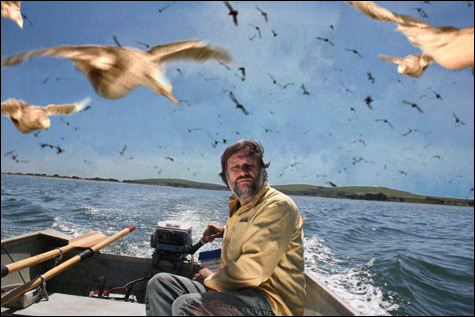
SLAVOJ À LA TIPPI: You want to do what with Rod Taylor? |
Slavoj Zizek, the fuzzy-bearded Slovenian philosopher, seems a fun guy. Like Roland Barthes or Camille Paglia, he glides effortlessly from highbrow to very low, finding thrills at all levels of culture. But the dipping-in point, Zizek’s hill of books, is another matter. Those not steeped in Lacan, Kant, and Hegel will find rough hoeing and going, no matter the pop-culture bridges to Hitchcock, David Lynch, and Julia Roberts.
Here’s an entry way: Sophie Fiennes’s three-part BBC video series The Pervert’s Guide to Cinema, a sampling of Zizek’s more accessible pronouncements on movies. This mindful, entertaining trio are being shown at the Harvard Film Archive April 6 and 8, though as one slightly numbing 150-minute piece. Snippets of all varieties of movie, from Andrei Tarkovsky to The Exorcist to a Disney cartoon, are accompanied by Zizek’s bubbly, non-stop commentary. Talking away, he’s filmed in multiple settings, sometimes where the movie scene under discussion was actually shot. A California trip takes him to the motel where Gene Hackman witnessed a murder in The Conversation, to the Universal Pictures back-lot set of Psycho, to the place under the Golden Gate Bridge where Kim Novak feigned a suicide attempt in Vertigo. In an inspired moment, he steers a motorboat across a bay the way Tippi Hedren did in The Birds, in the scene where she looks to shore and spies Mitch (Rod Taylor), the man who’s precipitating a hot crush. Zizek even channels Hitchcock’s libidinous heroine, exclaiming to the camera, “I want to fuck Mitch!”
Of course, you didn’t hear that line from Sir Alfred, and here’s one reason Zizek finds Hitchcock’s œuvre so intriguing: the superego self-censorship! No wonder Hitchcock kept the lid on: Zizek regards cinema as a Freudian boiling cauldron, with, in a typical narrative, a hidden war among the superego, the ego, and the id. Zizek cheers when the amoral id runs amok. That could be Harpo Marx chasing nymphs, or phallic heads exploding in a sleazy horror movie, or, in The Conversation, a toilet overflowing with blood and body parts. Zizek is fascinated by how, in Psycho, Hitchcock spends many minutes showing Norman wiping up the splatter after the shower murder. How much like cleaning up excrement! His overarcing view of the movie-watching experience: “Are we not staring into a toilet bowl waiting for things to reappear from the toilet? We are watching shit, as it were.”
Zizek sees cinema as a battleground of “the complex Oedipal universe.” He finds David Lynch films populated by obscene, out-of-control father figures who in their bullying sexual demands flush out other characters’ clandestine desires. He salutes Lynch’s madmen, Frank (Dennis Hopper) in Blue Velvet and Bobby (Willem Dafoe) in Wild at Heart. We limp wimps at the cinema feel liberated, buoyed by their aggressive, demonic perversity. For Lacanian Zizek, they are “truly fearless entities, non-castrated energy.” Each is “the phallus” itself, a walking, talking prick.
Like the mum citizens of Cornish, New Hampshire, discussing homeboy J.D. Salinger, the inhabitants of Fårö, a tiny Baltic island midway between Sweden and Latvia, plead ignorance of where its most famous resident, Ingmar Bergman, lives. For The Bergman Trilogy, April 7 and 19 at the MFA, the great octogenarian filmmaker invited Marie Nyreröd (and us) to that wonderful hidden house where he’s in retreat from his five ex-wives and eight grown children, and from the rest of the world. The talks are intimate, and disarmingly frank, about Bergman’s rowdy time in theater and film, and about his monkish Fårö self-exile.